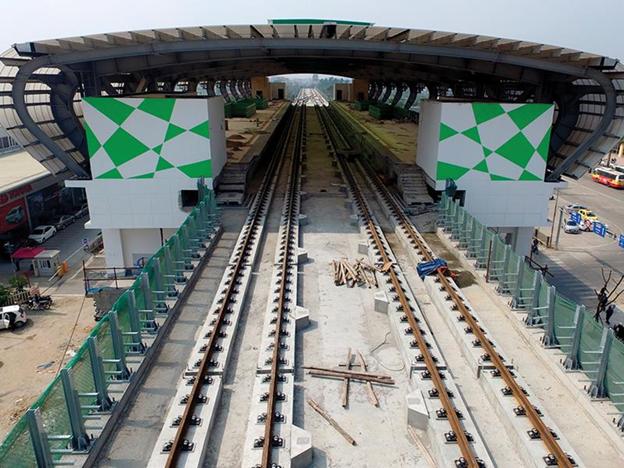
MoT is the first specialised state management agency to give feedback on the Hanoi People’s Committee’s latest proposal regarding investment plans for the metro railway projects.
In particular, MoT agrees with Hanoi’s undertaking to diversify investment capital for the three metro lines with the estimated investment capital of $15 billion, that are listed amongst the priority investments from now until 2025. These include the Noi Bai-Nam Thang Long section of Metro Line 2 (18 kilometres) and Thuong Dinh-Ring Road 2.5-Buoi (7km), the Van Cao-Hoa Lac section of Metro Line 5 (38.4km), and the Nhon-Troi-Dang Phuong section of Metro Line 3.
According to the Hanoi People's Committee’s report, the investment demand for metro lines in the city is around $40 billion.
“With such enormous investment resources, MoT agrees that apart from ODA loans, it is necessary to mobilise more capital from other sources following the the public private partnership (PPP) mechanism,” MoT Deputy Minister Nguyen Hong Truong shared.
Previously, at the end of June 2017, the Hanoi People’s Committee has reported to the prime minister on the implementation of metro line projects in Hanoi, and proposed investment plans, solutions, and implementation mechanisms.
According to the Hanoi Transportation Development Plan approved by the prime minister in 2016, the city will build ten metro lines with the total length of 417.8km, with 75.5km underground.
Regarding Hanoi’s proposal requesting the government to report to the National Assembly for authorisation to decide on the investment policy of the projects, in order to hasten the implementation progress. MoT supports the proposal.
MoT also agreed to Hanoi’s proposal requesting the prime minister to consider establishing a national steering committee for metro railway construction.
Concerns with suspended projects
MoT also has a number of recommendations regarding the massive investment scale, complicated technology, and large clearance area of the metro railways projects.
In particular, regarding Hanoi’s proposal to implement land acquisition and compensation in advance, based on the approved detailed plan, MoT warned that because a project’s actual scale and route may differ from the plan premature implementation may create problems, resulting in complaints and potentially lawsuits.
Additionally, on-going metro railway projects highlight technical complexities and require a long period of investment preparation and implementation, therefore acquiring land too early would create difficulties for land management agencies and generate bad publicity for the projects, potentially halting progress.
“If Hanoi’s proposal for land acquisition and compensation passes, MoT recommends carrying out further, more detailed studies to minimise complications and creating a plan to manage the cleared land fund efficiently during the project implementation period,” Truong added.
Regarding the authorisation to designate investors to implement projects under the PPP mechanism for investment preparation, land clearance, and construction, MoT states that designating investors prior to project approval will make it difficult to guarantee objectivity during the planning and approval process, as well as to guarantee the capacity of investors.
“It is important to realise that domestic enterprises have yet to fully understand the complexity of metro line projects, thus making it difficult to ensure their competitiveness in the investor selection process,” MoT warned.
VIR